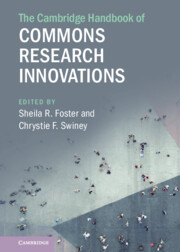Book contents
- The Cambridge Handbook of Commons Research Innovations
- The Cambridge Handbook of Commons Research Innovations
- Copyright page
- Contents
- Figures
- Tables
- Contributors
- Introduction
- Part I Revisiting the Origins and Evolution of Commons Thought
- Part II Averting New Tragedies
- Part III New Forms of Contested Commons
- Part IV Urban Landscape and Infrastructure as a Commons
- Part V Reassessing Old and New Institutions for Collective Action
- 13 Business Improvement Districts and the Urban Commons
- 14 To Have and To Hold? Community Land Trust as Commons
- 15 Ostromian Logic Applied to Civil Society Organizations and the Rules That Shape Them
- 16 A Conceptual Model of Polycentric Resource Governance in the 2030 District Energy Program
- Part VI Managing and Restoring the Commons
- Part VII Law, Legal Theory, and the Commons
- Part VIII Technology, the Internet, and the Future of Commons Governance
- Index
13 - Business Improvement Districts and the Urban Commons
from Part V - Reassessing Old and New Institutions for Collective Action
Published online by Cambridge University Press: 29 October 2021
- The Cambridge Handbook of Commons Research Innovations
- The Cambridge Handbook of Commons Research Innovations
- Copyright page
- Contents
- Figures
- Tables
- Contributors
- Introduction
- Part I Revisiting the Origins and Evolution of Commons Thought
- Part II Averting New Tragedies
- Part III New Forms of Contested Commons
- Part IV Urban Landscape and Infrastructure as a Commons
- Part V Reassessing Old and New Institutions for Collective Action
- 13 Business Improvement Districts and the Urban Commons
- 14 To Have and To Hold? Community Land Trust as Commons
- 15 Ostromian Logic Applied to Civil Society Organizations and the Rules That Shape Them
- 16 A Conceptual Model of Polycentric Resource Governance in the 2030 District Energy Program
- Part VI Managing and Restoring the Commons
- Part VII Law, Legal Theory, and the Commons
- Part VIII Technology, the Internet, and the Future of Commons Governance
- Index
Summary
This chapter focuses on the governance of the city and what we mean by the “urban commons” in regard to the Business Improvement District (BID), a hybrid public/private entity. There is no consensus on whether bodies like BIDs are an example of the urban commons or whether they exist to advance a narrow set of private property interests without the involvement of participants who have other claims to city space. Scholars have differently theorized BIDs in relation to the notion of the “urban commons,” both in regard to the property that they govern, and in the multifarious governance networks that result among them and other bodies, including city governments, neighbourhood associations, and other interest groups. Drawing on the work of Foster and Iaione and other scholars, I explore the existing legal framework of BIDs, asking whether they can be considered to be a form of urban commons by justifying a typology of analysis that focuses on decision-making, representation and accountability as elements of just urban governance.
- Type
- Chapter
- Information
- The Cambridge Handbook of Commons Research Innovations , pp. 155 - 163Publisher: Cambridge University PressPrint publication year: 2021

